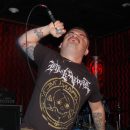
Music Connection: How has Germany been treating you?
Andy Biersack: Pretty good. We have the day off today. It’s our first day here and we’re just sitting around the hotel, tucked away in the countryside. There’s not a whole lot to do except catch up on sleep, which can sometimes be hard when you are so conditioned to doing stuff all the time. I think the only thing that they serve at our hotel is different egg things. Egg sandwiches, fried eggs… I love eggs, I’m a fan of eggs, but if I weren’t I think this would be a miserable experience.
MC: Sources say you formed Black Veil Brides in 2006. When did the concept first germinate in your mind?
Biersack: In 2006, I started the band name; the actual band itself didn’t really form until 2009. I was 14 or 15, growing up in Southern Ohio, when I had the idea for the band. It’s the only thing I have ever really wanted. I started playing shows when I could under the name Black Veil Brides, high school shows and what have you with various musicians around where I grew up. I moved to L.A. just before I turned 18, and that was when I met the guys that are currently in my band.
MC: What’s it like having numerous member changes in those formative years?
Biersack: Every band has member changes when they’re in that garage band stage. The only issue is that the name has stayed the same. I’ve never performed under any other name, so it appears that there have been a staggering number of member changes, which is really not true. Since 2009, we’ve had a solid lineup with really only one member change. But you will get things like Wikipedia that list all these names, and the picture gets painted that it’s just a revolving door of members, which is very untrue.
In any garage band or high school band, there are circumstances where someone can’t be in the band anymore because they have to go to college or other factors. So when you look at it from that perspective, it seems that the band has had a million people come and go, which is untrue. I can see why it seems that way, but very few people keep the same band name from the time they are 14.
MC: Wikipedia states that in 2007 you released the “Sex and Hollywood” EP which was independently funded. But is that true?
Biersack: Actually, that record doesn’t exist. There are things that are cited on Wikipedia that aren’t true, and I’m aware of what’s out there. We deal with misinformation on the internet all the time. The Sex and Hollywood EP, as it were, was three songs that were recorded in a basement in Kentucky with some friends of mine. It was a poor, low-budget thing that we later put up on iTunes as a bonus for fans. It was our first iTunes product, but it’s not really an EP. It had no distribution, and neither did the other false EPs that are listed online.
Never Give In also never existed. It’s cited on Wikipedia as having been recorded in California with a bunch of people that I hadn’t met until long after I moved out there, but it’s also cited as being with people that I knew in Ohio. The timeline says I was 14 and I was 19, I was in California and I was in Cincinnati, so there are some definite flaws with that story. We put out the songs that are listed as being on Never Give In independently on Myspace around 2008, and we may have burned those songs to discs to give to friends and people at shows, but it was never packaged or sold as an album.
We Stitch These Wounds was the first proper release. The internet being so unreliable, added to the fact that I have performed under the same name since I was 14, results in all this weird misinformation. Had I performed under any other name, there would never have been that association. There are some weird, crazy stories out there, none of which are true.
MC: We’re glad to be able to clear that up. Let’s talk about your indie label period. In the fall of 2009, you signed with independent label Standby Records. What can you tell us about that experience?
Biersack: I had moved to Los Angeles just as I was turning 18, and I was able to meet the director, Patrick Fogarty. Being a very cocky guy, confident in what the band was going to be, I bluffed and said that I would make a music video with him. I didn’t really think much of it, but after a month or so he called me and asked if I was still interested. The problem was that I didn’t have a band! I had played with various musicians back in Ohio, but since moving to L.A. I hadn’t really met a band. So I had a song but no band, no money, and a director who wanted to make a video.
I scraped up about $2,000, called in favors from friends and acquaintances, and was able to get two people to come and make the video with me. The drummer in the video stayed with the band for a while, but the guitarist wasn’t actually ever in the band. “Knives and Pens” exploded on the internet, and Standby Records contacted me after it reached a couple million views. By that point, I had met the people that would end up forming the real lineup of the band.













